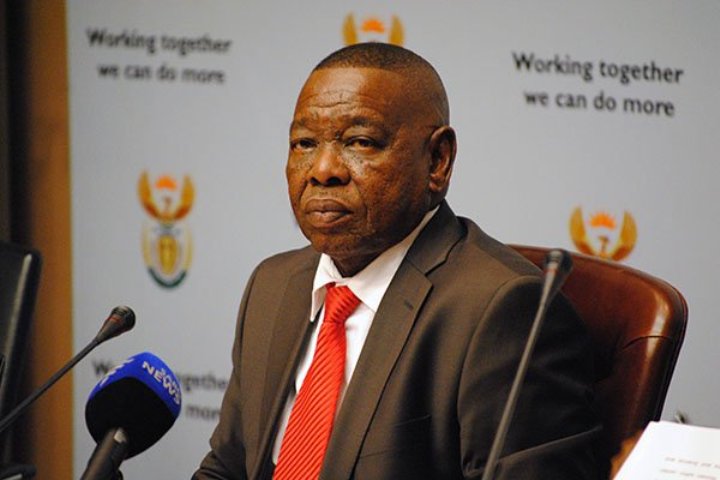Nzimande Calls for STI-Driven Development to Secure South Africa’s Future
To address structural inequities in research funding and participation, the department is working with the National Research Foundation (NRF) to establish targeted Research Chairs aimed at transformation.

- Country:
- South Africa
South Africa’s Minister of Science, Technology and Innovation, Professor Blade Nzimande, has called for science, technology and innovation (STI) to be placed at the heart of South Africa’s development agenda, warning that the country’s long-term sustainability hinges on its ability to harness the transformative power of research, innovation, and scientific talent.
Presenting the Department of Science and Innovation’s (DSI) Budget Vote in Parliament on Wednesday, Minister Nzimande framed his address within the context of global uncertainty and domestic challenges, including climate change, socio-economic inequality, technological disruption, and stagnating economic growth.
“We deliver this Budget Vote against the background of a complex set of national and global challenges... South Africa must place science, technology and innovation at the centre of government, education, industry, and society if we are to secure our sovereignty and future sustainability,” he said.
Taking Science to the People
As part of the government’s renewed commitment to democratizing science, Nzimande pledged to expand STI outreach to rural areas, townships, and marginalized communities, stating that science and technology must not be “the preserve of the elite,” but a pillar of inclusive national development.
This vision will be executed through public education, mobile science platforms, and partnerships with provincial and local governments. The Minister also emphasized that STI must actively contribute to social cohesion, climate resilience, and economic transformation.
Expanding Scientific Talent: The Presidential PhD Programme
Highlighting the department’s efforts to build a robust scientific and research workforce, Nzimande announced the scaling up of the Presidential PhD Programme, launched in 2023 to increase the number of doctoral graduates, particularly among black South Africans, women, and students from historically disadvantaged institutions (HDIs).
He also noted that 288 Research Chairs have been awarded to 22 universities and national research facilities across various disciplines. However, the Minister voiced concern that HDIs and black researchers have not benefitted as expected, calling for greater inclusivity in the National System of Innovation (NSI).
“Our NSI is still characterised by several transformation deficits, including the low participation of women at the highest levels. We must address this if we are to build a truly inclusive innovation ecosystem,” he stated.
Transforming the National System of Innovation (NSI)
To address structural inequities in research funding and participation, the department is working with the National Research Foundation (NRF) to establish targeted Research Chairs aimed at transformation.
Additionally, Minister Nzimande outlined measures to strengthen coordination and oversight of the NSI through:
-
The Inter-Ministerial Committee on STI
-
The Presidential Plenary on STI
-
Enhanced policy alignment and funding coordination instruments
The outcomes of the first NSI Transformation Summit, hosted in March 2025, are now being integrated into the DSI’s strategic plans under the guidance of the department’s Director-General.
Innovation Fund and Venture Capital Support
The Minister confirmed that the Innovation Fund will be ramped up in 2025–2026, with the goal of supporting 10–15 venture capital funds through strategic partnerships, including collaboration with the Technology Innovation Agency (TIA). This effort is expected to fuel high-potential innovation ventures and improve commercialization of South African research.
Strategic Focus Areas and Global Cooperation
Minister Nzimande reiterated South Africa’s commitment to increase Gross Expenditure on Research and Development (GERD) to 1.5% of GDP, a key target for strengthening national competitiveness. This goal will require a tripartite agreement among government, business, and labour to secure long-term research funding.
The DSI is also expanding efforts in high-priority areas under the STI Decadal Plan, including:
-
Artificial Intelligence and Machine Learning
-
Energy security and hydrogen research
-
Space science and exploration
-
Vaccine development and manufacturing
-
Nuclear Medicine Research Infrastructure (NuMeRI)
-
The Square Kilometre Array (SKA) radio telescope
-
Pandemic preparedness and biotechnology innovation
-
Indigenous Knowledge Systems (IKS)
South Africa’s upcoming G20 Presidency will be leveraged to advance these priorities regionally and globally, ensuring that STI remains central to Africa’s development narrative.
Support for Palestinian Science and Researchers
In line with its foreign policy priorities, the Minister affirmed South Africa’s continued support for Palestinian researchers and institutions, emphasizing solidarity and cooperation in academic and scientific development. This programme, he noted, is progressing steadily.
Raising Public Awareness of Science’s Role
The DSI will also launch a vigorous public engagement and communication campaign to raise awareness about the role of STI in everyday life, economic progress, and human development.
“We must make visible the invisible work of science,” said Nzimande. “South Africans should see how science powers our agriculture, our health systems, our technology, and even our economy.”
STI as the Foundation of Future Prosperity
Minister Nzimande’s Budget Vote speech reflects a comprehensive commitment to inclusive innovation, scientific excellence, and policy-driven transformation. His address reaffirms science and technology as not only tools for economic growth but also vehicles for empowerment, social equity, and national resilience.
As the country moves forward, South Africa’s science policy is poised to shape the future, not just for researchers and entrepreneurs, but for communities in every corner of the nation.
- READ MORE ON:
- Blade Nzimande
- STI South Africa
- Science Budget Vote 2025
- National System of Innovation
- Research Chairs
- Innovation Fund
- Presidential PhD Programme
- G20 South Africa
- Science Transformation
- Artificial Intelligence
- Vaccine Manufacturing
- Indigenous Knowledge
- GERD
- SKA
- NuMeRI
- Technology Innovation Agency
- DSI Budget 2025
ALSO READ
Alexander Skarsgard Reflects on Hollywood Struggles and Breakthrough
Teen Skateboarding Star Arisa Trew Makes History at X Games
Tony Hawk's Legendary Skateboard Set for Auction to Build Skateparks
Tony Hawk Auctions Legendary '900' Skateboard to Fund Skateparks
Tony Hawk's Iconic Skateboard Set for Auction: A Legacy of Mid-Air Magic










